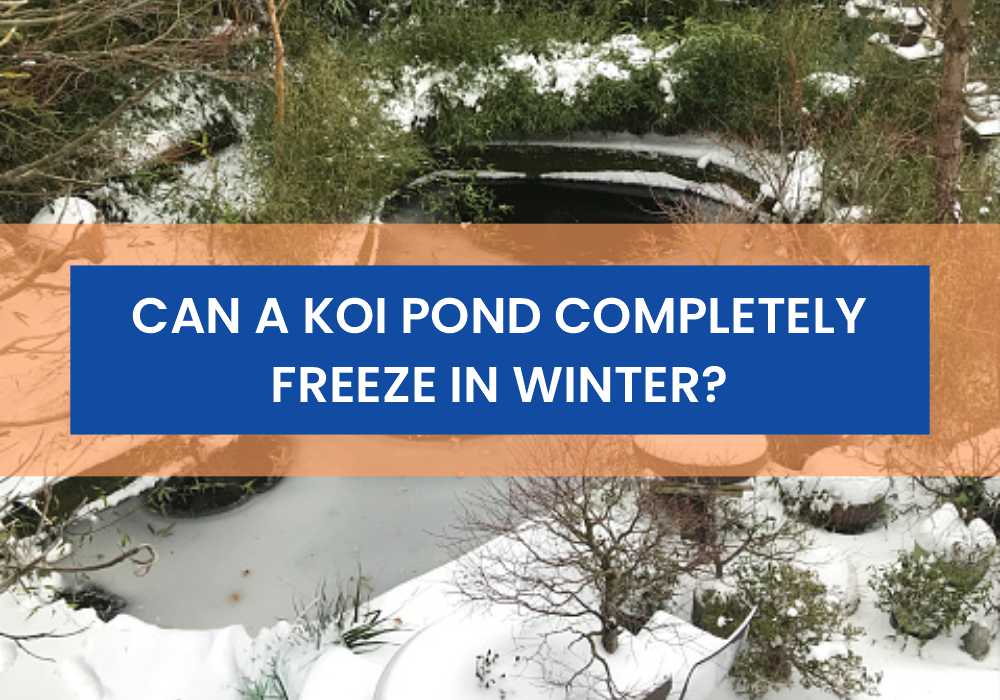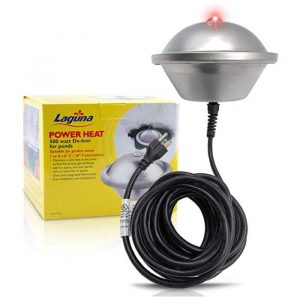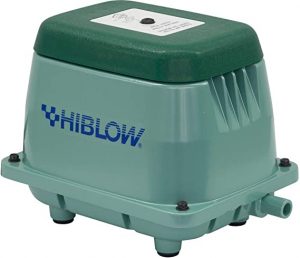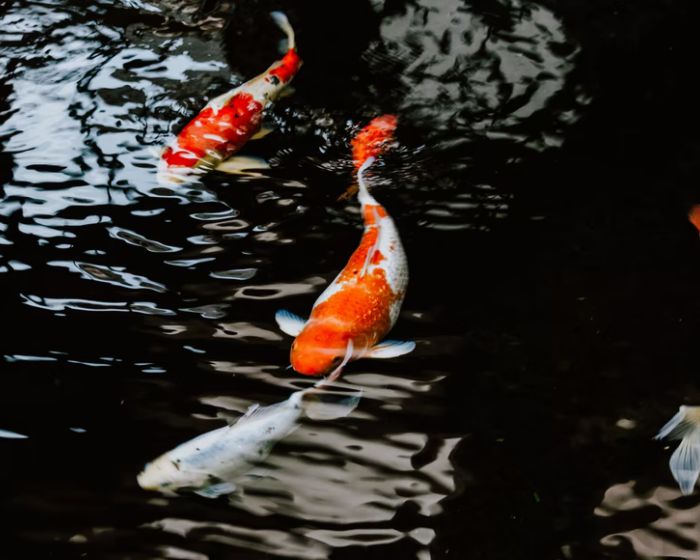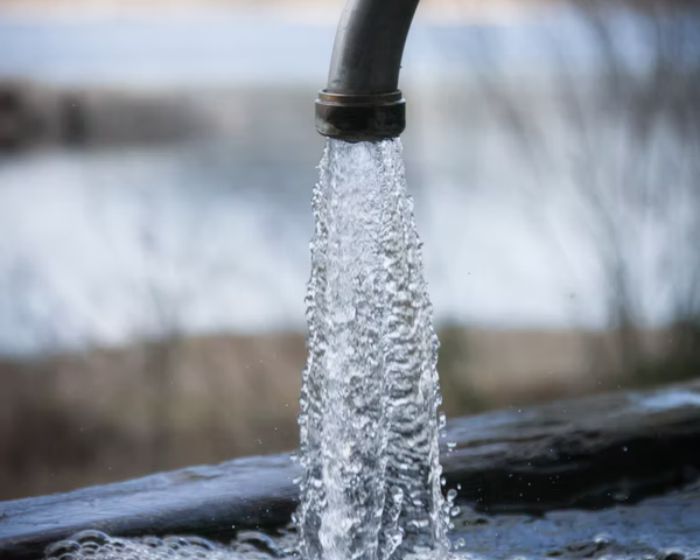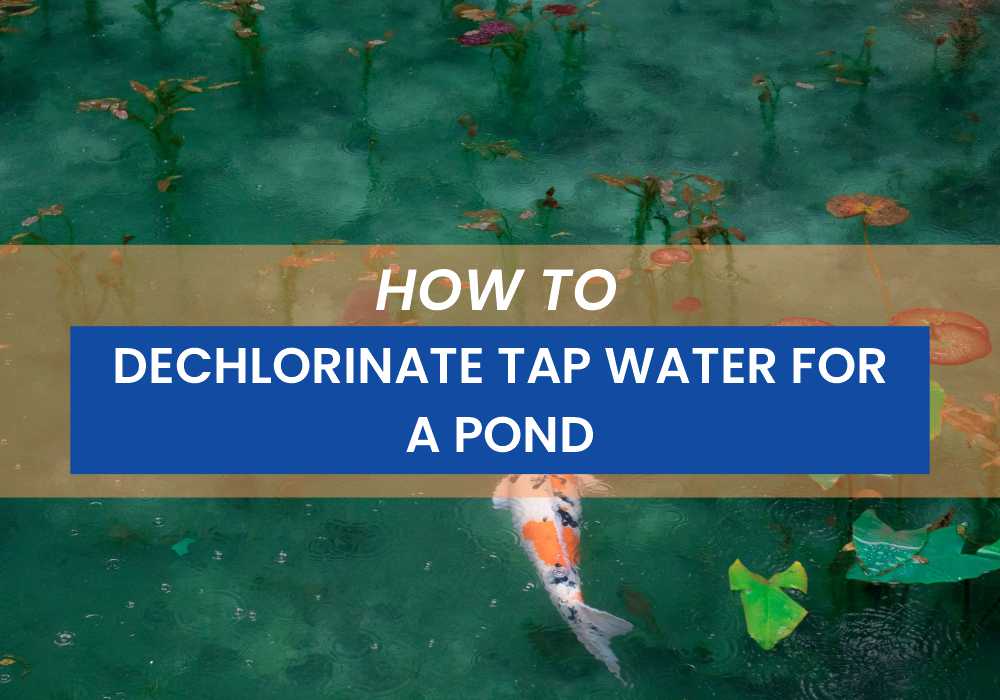As an Affiliate, We may earn a commission that doesn't cost you extra from qualifying purchases using links in this post. It helps keeps this blog running.
As a lover of koi or even just a keeper of the remarkable fish, you know something about the fish’s needs. One of those needs is a pond to call home. Because your koi are cold-blooded, they cannot adapt to colder waters by producing more red blood cells to carry oxygen throughout their bodies. The need for an adequately warm environment is one reason that ponds with koi are usually built into or near areas that receive full sunlight and heat throughout the day.
Then comes winter, and temperatures drop below freezing at night. This is one of the reasons many koi pond owners use a heater to keep their ponds’ water temperature warm through the cold months of winter. But what happens if you were to forget to turn your heater on? Is it possible for a koi pond to freeze?
Can a koi pond completely freeze in winter?
Yes, koi ponds can completely freeze in a strong and long winter. As long as the pond’s water temperature is below freezing and there isn’t a heater to keep it warm, most of the water will become solid. Of course, this doesn’t mean that your koi are done for because Koi are actually very good at adapting to freezing weather.
There will be pockets of unfrozen water – especially where there is a bit of shade and where the koi tend to hang out. When they do this, it is possible for them to survive on the pockets of unfrozen water that remain because oxygen will still be present in the pockets. They can even find their own food in those spaces if ice algae form on top of the ice cover.
However, if the temperature stays below freezing for too long, your koi are in danger of dying. This is because the oxygen in the unfrozen pockets will not be able to support them for an extended period of time. If you believe that your koi may be in danger, it is best to warm your water using a water heater and feed them a high-energy food like trout chow until the temperatures rise again or your heater kicks on.
Can a koi pond freeze overnight?
Yes, koi ponds can freeze overnight especially during winter if your pond is in an area with low sunlight or little to no insulation around the pond. This tends to make water temperature fall faster, which means it will be more likely for your koi pond (and the koi living inside of it) to freeze completely.
During winter the weather is freezing and the atmosphere temperature is cold rivers, lakes and even ponds tend to freeze even faster. This will happen when the water’s temperature is below the freezing point of 32 degrees Fahrenheit or 0 degrees Celsius.
If your koi pond does freeze over, don’t panic. It doesn’t mean your koi are gone forever. Koi can survive in frozen waters especially if there are still pockets of unfrozen water around the area where the koi are hanging out. However, if the temperatures stay below freezing for several days, the koi fish will exhaust the limited oxygen in the ice water pocket and your koi may die because they will not be able to breathe due to the lack of oxygen present in pockets of unfrozen water.
What happens if my koi fish pond freezes?
First of all, you don’t need to panic. If you do not act quickly you may lose a small portion of your koi fish but most will survive and adapt to the change in temperatures.
If the koi fish pond completely freezes over:
– The oxygen level is extremely low under ice cover. This can cause some problems such as suffocation and depleting air bubbles.
– Fish who like to eat or catch shrimps under ice cover won’t be able to do so because they cannot see where their prey is hiding anymore. Koi fish who feed mostly on algae on the bottom of ponds will not starve because there’s still plenty of food for them and they don’t need much energy at all compared with active fish that swim often throughout the day.
– You should start feeding your koi fish with high-energy food such as trout chow in case the pond completely freezes over.
– Install a heater to warm up the pond temperature and keep it above the freezing point. Once the ice cover thaws you’ll have to take steps to make sure your koi fish pond doesn’t completely freeze over again, such as insulating the pond from winter weather and installing a heater to maintain a warmer temperature. You can also plant more trees around this area or move your koi fish pond to a warmer and more sunlit area.
If the pond only partially freezes:
– The oxygen level is great and ice algae can offer a nutritious snack for your koi fish.
– Your koi fish will be able to see where their prey hides under ice cover, so they can eat shrimps and worms around the frozen part of the pond.
– The ice cover won’t be too thick because it’s only partial freezing. If you leave the heater on, it might prevent another freeze over if there’s enough insulation around the pond or pool. However, you’ll need to watch out for this because if the air temperature suddenly rises above freezing, your koi fish can suffer from oxygen depletion.
– There’s no need to feed your koi with high-energy food because the ice algae is a great source of nutrients for them. If you want to feed them something else on top of that, you can add trout chow+ once or twice a day.
What do I do if my koi fish pond is frozen?
If your koi pond is frozen, there are ways you can save your koi fish. The first thing to keep in mind is that ice algae present on the surface of the ice cover will provide food for koi. You can help them by cutting a hole through the ice so they have access to this source of food.
Another way to help your koi survive is by using an underwater heater if you have one available. This will prevent the water below from completely freezing over while still providing heat for your koi. Your koi may even be able to find patches of unfrozen water underneath the ice cover where they can find oxygen and sustain themselves until it gets warm enough outside. If there are no pockets of unfrozen water around the koi, however, they may not be able to survive.
How cold can a koi fish pond get?
Koi fish can live in water that is as low as 34 degrees Fahrenheit to as high as 90 degrees Fahrenheit, and if Koi can live in such temperature then a koi pond can get as cold as 34 degrees Fahrenheit to as high as 90 degrees Fahrenheit and even lower. Koi fish are able to survive if the pond freezes mostly around the edges of their pond. This is because koi fish can live with little oxygen and less food than other species, adding to their capacity for survival.
how do koi fish survive in a frozen pond during the winter?
Koi fish can survive in a frozen pond by staying at the bottom of the water and breathing air from under the ice cover that is mixed with oxygen. They do this by digging through the muck at the bottom to reach air bubbles which they breathe. During this time, koi will eat whatever algae and food were leftover from before winter from the ice cover.
In addition, if the koi’s pond freezes partially and there is still a layer of water underneath it, the koi fish will be able to use oxygen from above the ice cover because there is less pressure on the top. When doing this, they can find places without an ice cover that have unfrozen water where they can also find air and oxygen and survive until the koi fish pond warms up in spring.
Koi fish can also survive by eating ice algae, which they scrape off of the surface of the koi fish pond. This is why it’s important to break a hole into the ice for them so that they have access to this food source.
what happens to koi fish when a pond freezes
When a koi fish pond freezes, it is likely that some of the koi fish will be able to survive. The reason for this has to do with the air and water temperatures, as well as how cold they get at night and during the day. In order for a koi fish pond to freeze completely, the temperature has to be at or below 32 degrees Fahrenheit. In areas that have mild winters, it’s possible that the water will remain unfrozen even though the air temperature is below freezing. However, if the temperatures consistently stay around freezing throughout winter nights and days, there is a good chance that all of the water in a koi fish pond will freeze solid.
A koi fish pond can freeze from top-down or from the bottom up. If the water freezes from top-down it will likely kill all of the fish because as the ice starts forming on the surface, it makes it harder for oxygen to enter into the water through diffusion as well as making it difficult for any excess gases such as carbon dioxide to escape from the water. In a koi fish pond that freezes from the bottom up, it is possible for some of the fish to survive because they can stay at a depth where there is less likelihood of ice forming and cutting off the oxygen supply from the surface.
How to prevent koi fish pond from freezing over
For those who are truly concerned about their koi pond freezing over during wintertime, there are precautions you can take to prevent your koi pond from completely freezing because koi fish like to live in water that is between 50 and 60 degrees Fahrenheit.
Koi fish ponds generally freeze at different times throughout winter depending on how cold the area is and where the pond is located. In areas where temperatures stay around freezing throughout most of the winter or drop below those temperatures, koi fish ponds have been known to freeze from top-down as well as from the bottom up.
If you’re really concerned about your koi pond freezing, there are things you can do to prevent the koi fish pond from freezing over
1) Insulate around the perimeter
The first way is by insulating around the entire outer perimeter of the pond with hay bales or straw before winter hits. This might help keep some of the heat in.
2) Install a pond heater
Another way is to find out where your koi tend to hang out and place a water heater or power zappers as a way to maintain the temperature so they can stay warm even if there are still pockets of unfrozen water around them. You may want to turn them off during the day when the temperature is warmer as well as overnight, as this may help save money.
Laguna PowerHeat Pond De-Icer
The recommended pond heater is the Laguna PowerHeat Pond De-Icer with an LED light that indicates when the machine has begun heating up the pond. It also helps release toxic gases from fish respiration and decomposing organic matter to escape. At the same time, it allows oxygen to re-enter the pond.
3) Install a Pond Aerator (“Air bubbler”)
You can also place an “air bubbler” in the pond to help prevent the koi from suffocating if they happen to be at a depth where there is no water that’s unfrozen. This works by adding air into the areas of the pond that may become isolated as well as helping to circulate oxygen throughout the entire water column, which will make it difficult for the koi to suffocate.
HIBLOW HP-80 Pond Aerator
The recommended pond aerator is the HIBLOW HP-80 Pond Aerator with a low sound level. It also helps water circulation and aerates ponds up to 1/2 acre at 10′ or less in depth. At the same time, it is energy efficient and oil-free.
4) Increase the depth of your koi pond
Another way is to increase the depth of your koi pond by placing a plastic liner underneath and/or on top of the existing liner if possible. This will prevent the bottom and sides from freezing as well as make it harder for ice to form on top.
5) Add plants and fish food
The last thing you can do is add more plants as well as fish food to help prevent the koi from going hungry. You can also find a way to keep them separated from any predatory animals that may be lurking around the area and cause the koi fish pond to freeze over.
As long as you take some precautions, your koi pond should not freeze over completely during wintertime.

I’m Akin Bouchard. Even though I now own several different fish species, I first became a koi pond owner because I loved these creatures and wanted to turn my passion into something more serious. I take pride in my collection of koi fish and love sharing my knowledge with others interested in these beautiful creatures.
A Comprehensive Guide to Training Your Fish to Perform Amazing Tricks Feats

